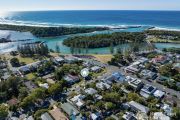
From data centres to yacht marinas, alternative real estate booms
From data centres to pubs, investors are pouring into the alternative real estate sector which can offer higher returns than traditional real estate assets, as long as investors understand what they’re buying into, industry experts say.
An alternative real estate asset is anything outside of retail, commercial, residential and industrial property classes. Examples include self-storage facilities, childcare centres, marinas and purpose-built student accommodation.

The sector recorded sales of about $12.4 billion in 2024 – excluding global alternative asset giant Blackstone’s $24 billion deal for data centre firm AirTrunk – increasing by more than 50 per cent on 2023’s investment volumes of $8 billion, according to research from Cushman & Wakefield.
Julian Biggins, joint chief executive at investment manager MA Financial, says there are fewer players in the space, leading to higher returns than core assets – as long as investors understand what they are buying into.
“If you turn the clock back 30 years, people really only invested in the core asset classes, being retail, commercial, industrial,” Biggins says.
“Fast forward to today, and there’s a whole plethora of alternative asset classes that sit out of those core asset classes.”
The use of artificial intelligence and cloud computing is set to double demand for new data centres by 2030, with an extra 175 facilities needed, according to a JLL report.

Yacht marinas are also proving to be a lucrative alternative real estate investment as the demand for berths grows as more Australians buy boats – which are also getting larger.
MA Financial has doubled down on this demand, establishing a fund two years ago offering investors exposure to the largest marina group in the southern hemisphere, d’Albora Marinas.
Australian funds manager Centuria Capital Group’s alternative real estate assets under management have increased from $700 million to $4.9 billion between 2020 and 2025 – a 48 per cent compound annual growth rate.
A quarter of its portfolio is devoted to alternative real estate assets, with $2.3 billion in real estate finance, like private credit, $1.4 billion in healthcare, $700 million in agriculture, and $500 million in data centres.
Jason Huljich, joint chief executive at Centuria Capital Group, says there is strong investor demand for alternative investments suchas agriculture and data centres.

“The housing crisis is fuelling demand for private real estate finance from developers, while high net worth investors are chasing high yields across short-term (12-18 month) investment options,” he says.
In August last year, the company secured a 50 per cent interest in ResetData, a provider of cloud and neocloud infrastructure and AI capabilities.
“While peers may be focused on securing traditional data centre warehouses, we view the liquid cooling infrastructure to be more sustainable, has a higher capacity in a smaller footprint, and it lends itself to the latest AI chips,” Huljich says.
But every investment comes with risks, and the most common barrier to alternative real estate assets revolves around the knowledge of their specialisms, he adds.
“Unlike offices, warehouses and retail centres, healthcare assets have particular requirements and knowing operators’ requirements, public and private healthcare structures and regulations is quite a specialism,” Huljich says.
Barriers to entry
Sarah Gonzales, chief investment officer at Apt Wealth Partners, says regulation, higher operating costs and the nascent nature of some of the industries backing these investments could be barriers to entry for some investors.
“There is heavy regulation around starting up an aged-care facility, for example,” Gonzales says. “On the other side of that, [there’s the potential of] the government putting in restrictions on the data centre side because it isn’t heavily regulated.”
Biggins says that in the 25 years he’s been in real estate, he’s seen a lot of capitalisation rate compression driven by lower interest rates, leading to higher returns.
“We’re trying to find unique asset classes … these are real, quite protected bits of real estate, well located,” he says. “You’re not seeing a lot of new supply and the underlying demand fundamentals are quite strong.”
MA Financial is fully integrated in the pub space, for example, with its hospitality subsidiary, pub owner and operator Redcape, which offers acquisition opportunities and divestments into the industry.
About 10 years ago, many alternative real estate assets were considered “cottage industries” – a term to describe small-scale businesses – like self-storage facilities and childcare centres, which evolved over time and were now attractive to institutions, he adds.
“We’re trying to find those cottage industries, institutionalise the operating structure around that asset class, and build it to a certain scale where it’s attractive to institutions,” Biggins says.











